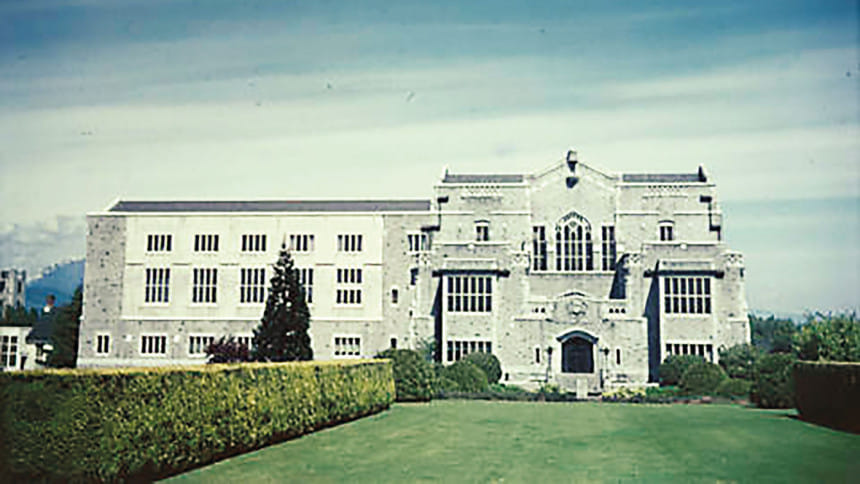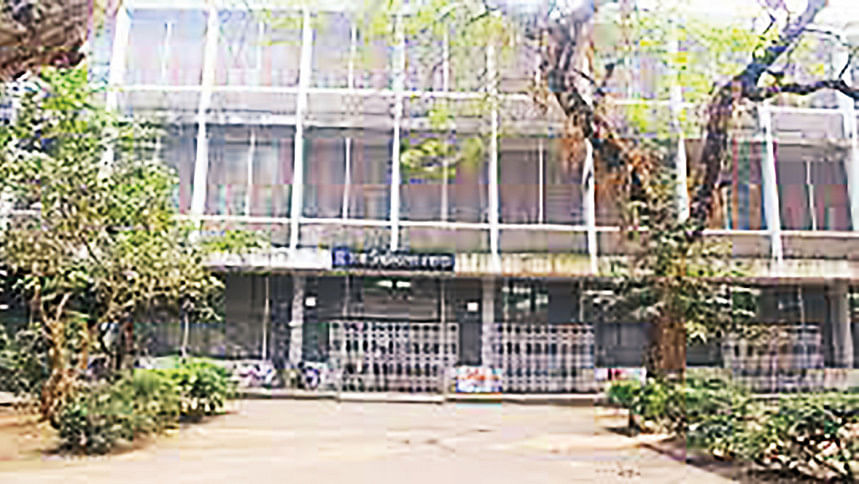Paradisal Libraries

1
Younger people might find this too dated, but I will stick by what Jorge Luis Borges once said: "I have always imagined that Paradise will be a kind of a Library!"
Well, not always! Till I was in my second year at DU, I would spend at least a few days of the week in Dhaka's USIS and British Council libraries to read British/American newspapers or literary periodicals like TLS and The New Yorker, or to borrow novels that I could devour at home later. But there were lots of other things to distract us friends then. Bliss was playing basketball or cricket or chatting with friends or ogling girls passing by when chatting!
It was only late in my second year at DU that one of my dearest school friends asked me soberly if was I going to get serious about doing very (and not quite) well in exams. For middle-class boys like us, he pointed out to me and two other friends, doing very well was important, for if you had a first and scored high in TOEFL/ GRE, you had a good chance of going to a North American university.
That was how I ended up spending almost all my days in the DU Main Library. At first though, it didn't seem like a place where we would be able to spend any time at all. There were too many rules and you had to be patient for there was always a queue to get books. The library staff, too, at first seemed to be overworked/indifferent, and patience I am temperamentally short of!
But I persevered. And that is how I became whatwe call a "serious" student, determined to spend as much time as I could in the DU library. I soon found out what a treasure trove the library was. Whether I looked for books on Sophocles or Shakespeare, or wanted to discover the "Elizabethan World Picture," or admire contemporary stars of Literature, or whether I wanted to find out why Milton opted for the grand style, or tried to divert myself from Eliot's apocalyptic waste land musings by reading his hilarious book on practical cats, the 2nd floor collection of English department books seemingly had it all.
One other section I found fascinating was the reference section books in the ground floor. It had, for instance, twenty volumes of Scrutiny that I found superbly educative. But when I wanted to turn away from serious literary criticism, I would find Gershon Leghorn's 1968 book The Rationale of the Dirty Joke captivating, not really for its psychoanalytic take on such humor, but for the kind of laughs we teenagers now turning men were still addicted to. There were abundant newspapers and periodicals as well—favorite reading of those who came to the library to keep up with news from all over the world.
But, of course, I was in the library to study. I kept doing that seriously, along with my three other friends. In a year's time, I found out that the library staff members on duty, especially in evenings when student attendance was thin, were not unfriendly at all. In the evening, they would even allow me to wander across the aisles stacking literature books. I found thereby access to some very old collection that had somehow become part of the stacks. Some were also in the "confined' section of the library—books like Sir Walter Raleigh's the History of the World, published, I remember even now, in a Victorian gilt-edged cover edition.

My reputation as a serious, 'bookish' student grew. But what cared I for such labelling, knowing that I had found a gateway to a paradise of sorts through reading? Keats' "Ode to Chapman's Homer," so beautifully vivid in depicting how a book is a magic carpet to glimpse paradise, seemed to fit my sentiments well. "Much have I traveled in the realms of gold/And many goodly states and kingdoms seen," Keats wrote, but when he came across Chapman's book, he declared, he had become a "watcher of the skies/When a new planet swims into his ken." Going to the DU library was to add to the literary planets I was regularly placing in the firmament of my imagination to return with an enhanced understanding of the makers of literature in English.
When our eyes tired of reading, we would take tea breaks every couple of hours, spending a lot of time in Sharif Mia's canteen. Students, budding as well as established writers, and close couples would chat on in the canteen as Sharif Mia poured hot, steaming tea to relax fatigued eyes and recharge imaginations bent on exploring the world of knowledge. We four had made the library our base, but we would do classes, play and watch sports and cultural events taking place in the gymnasium playing ground and TSC in between our reading sessions. The days went quickly and we knew we were spending them well, not only acquiring knowledge but also socializing and having fun.
II
I have been fortunate to spend three weeks doing research on Edmund Burke in the British Library, when it was housed alongside the British Museum in Bloomsbury, London. It was a thrill to work in its reading room and read signs telling you that Charles Dickens, Karl Marx and Virginia Woolf and others had studied there. Once I could even imagine their presence in the round shaped reading room! People came from all over the world either to view the collections on display or visit the neighboring British Museum, or to do research.
However, the one major library of the world that I got to know really well for an extended period of time is the University of British Columbia's Main Library in Vancouver. Both while working on my Simon Fraser University M. A. dissertation and my doctoral dissertation for UBC, I would spend most of the day in this imposing Victorian style building. What I know from almost six years of work in this highly rated library is that one could get almost any book or periodical one wanted to access by going to the card catalogues and then to the stacks holding the books. And if they proved inadequate or confusing one could go the reference librarians on duty, whose knowledge of the library's holdings was simply amazing and whose enthusiasm to assist readers was always astonishing. And if even they could not help readers locate sources or things in print in the library, they could get it by letting us fill up the appropriate interlibrary loan form, wait a week or so and then have them!
I researched first on Herman Melville and the city, looking up his fictional works and poetry, letters, journals as well as old newspapers, reviews and books of criticism. Mid-nineteenth century New York came alive and Melville's leviathan imagination swam into my vision as never before! Later, I worked on Daniel Defoe, but now my research took me back to Francis Bacon and the history of science, mercantilism, colonial history, seventeenth- and eighteenth-century cartography. New worlds kept opening up and I felt like the young Keats again, travelling in "realms of gold," glimpsing islands and peoples having to do with British colonial expansion, and getting to admire Defoe more and more, who seemed to know so much about the world outside Britain even in the eighteenth century.
Because I had taken a course on textual criticism, I had by this time also learned to appreciate book printing, design, editing, etc. I could view many of the antique books in the UBC collection as art objects, beautifully illustrated and lovingly bound together. Some had the unique smell that bibliophiles love. Many could be exhibition pieces and wonder-inspiring even in stacks!
I never ever felt bored. When I had enough of research, I would read my favorite newspapers and periodicals. The UBC library used to get the (now defunct) Bangladesh Times, which kept me in touch with happenings in my dear country. When my eyes got fatigued, and if the day was bright and sunny, I would head off to the neighboring Rose Garden, and laze in the sun for an hour or so, or have a cup of tea in the basement coffee shop, or head off for adda with my Bangladeshi friends or a friendly Canadian T.A. The UBC Main library, like all great libraries, had infinite variety, although only the fully initiated can appreciate the range of delights to be experienced in them!
III
And what will be the fate of the great libraries of the world in this superfast digitalizing world?
The DU library is now coveted, newspapers keep reporting, not for its book and newspaper collections, but for its spaces where students can study in relative silence for competitive examinations. The library, indeed, has been digitalized to a great extent and students who want to, can assess much information online. In contrast, and from what I can tell from the UBC Main Library website, it has not only digitalized completely but has also been attracting not only students and faculty members but also the general public to its 6 million books and displays sections. Now that the pandemic has stopped people from intermixing anywhere, there is even a "material picks up service", or so the webpage tells me.
There is no telling where digitalization and science will take us, but as I googled to find another suitable quote to end this piece I came across Albert Einstein's one: "The only thing that you absolutely have to know, is the location of the library." In this day and age, I guess, one has to add, digitally, virtually or in reality. Thankfully, paradise is still there to be glimpsed though its collections, if not the sheer delight of fingering books and leafing through them, page after pager, book after book!
Fakrul Alam is Director, Bangabandhu Research Institute for Peace and Liberty, and UGC Professor, Department of English, University of Dhaka.

 For all latest news, follow The Daily Star's Google News channel.
For all latest news, follow The Daily Star's Google News channel. 



Comments